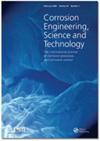基于人工神经网络的铝牺牲阳极效率预测
IF 1.5
4区 材料科学
Q4 MATERIALS SCIENCE, MULTIDISCIPLINARY
Corrosion Engineering, Science and Technology
Pub Date : 2023-09-01
DOI:10.1080/1478422X.2023.2252258
引用次数: 0
摘要
摘要研究探索了一种基于深度学习的方法在预测海洋环境中铝牺牲阳极电流效率方面的潜力。该模型考虑了各种输入变量,包括牺牲阳极的化学成分、pH、溶解氧(DO)、温度、压力、阴极电极、电流密度和阴极与阳极的表面积比,阳极电流效率作为输出变量。在本研究中使用人工神经网络显示,预测当前效率的训练和验证的平均绝对百分比误差分别为6.4%和7.8%。该模型在预测铝牺牲阳极电流效率和改进基于铝牺牲阳极的阴极保护系统设计方面显示出良好的潜力。本文章由计算机程序翻译,如有差异,请以英文原文为准。
Artificial neural network modelling to predict the efficiency of aluminium sacrificial anode
ABSTRACT Study explores the potential of a deep learning-based approach for predicting the current efficiency of aluminium sacrificial anodes in marine environments. The model takes into account various input variables, including the chemical composition of the sacrificial anode, pH, dissolved oxygen (DO), temperature, pressure, cathode electrode, current density, and the ratio of the surface area of the cathode to anode, with the anode current efficiency serving as the output variable. Utilising artificial neural networks in this study shows a mean absolute percentage error of 6.4% and 7.8% for the training and validation for predicting the current efficiency. The proposed model shows promising potential to predict the current efficiency of aluminium sacrificial anodes and improve the design of cathodic protection systems based on aluminium sacrificial anodes.
求助全文
通过发布文献求助,成功后即可免费获取论文全文。
去求助
来源期刊

Corrosion Engineering, Science and Technology
工程技术-材料科学:综合
CiteScore
3.20
自引率
5.60%
发文量
58
审稿时长
3.4 months
期刊介绍:
Corrosion Engineering, Science and Technology provides broad international coverage of research and practice in corrosion processes and corrosion control. Peer-reviewed contributions address all aspects of corrosion engineering and corrosion science; there is strong emphasis on effective design and materials selection to combat corrosion and the journal carries failure case studies to further knowledge in these areas.
 求助内容:
求助内容: 应助结果提醒方式:
应助结果提醒方式:


